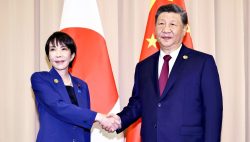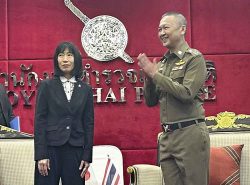Joint Development of Frigates: Take This Opportunity to Boost Security Cooperation with Australia
15:02 JST, December 17, 2024
If Japan and Australia could jointly develop frigates, it would improve their ability for interoperation using the vessels and strengthen the framework for protecting maritime security. The Japanese government must take the necessary measures to win the contract.
A joint development project for frigates was announced by the Australian government in February this year. Canberra plans to introduce 11 new-type naval vessels into its navy around 2030, and it named Japan, Germany, Spain and South Korea as four possible partners for the joint development. Last month, the government narrowed down its choices to Japan and Germany.
With China having intensified its hegemonic activities in the East China Sea, the South China Sea and around Pacific island nations, it would be significant for Japan and Australia to operate the same frigates to improve their response capabilities, such as in warning and surveillance activities.
It would be possible to make repairs and conduct inspections in either country, and uniformed officers would be able to keep in close contact with each other. The project is expected to deepen security cooperation between the two countries.
However, some believe that it will not be easy for Japan to win the contract.
Japan has put forward a plan to jointly develop with Australia a new type of vessel based on the Mogami-class frigate, whose deployment with the Maritime Self-Defense Force began in 2022.
A Mogami-class frigate can be operated by a staff of 90 people, about half the number required by conventional vessels, thanks to automated maneuvering and various other functions. The frigate is also advanced in that it is equipped with minesweeping and stealth capabilities.
On the other hand, the vessel on which Germany, Japan’s rival, would base the new frigate reportedly has a higher radar detection capability than that of a Mogami-class ship and can clearly recognize vessels that would pose a threat even from a distance.
There is an urgent need to improve the detection performance of Mogami-class ships. If the current development company cannot handle the improvement, then cooperation should be strengthened with other companies with knowledge of the technology.
Japan previously made a bid to participate in a joint development project for Australia’s next-generation submarines, but missed out on the contract. France, which won the contract, is said to have stressed that it would secure large-scale employment in Australia.
To avoid making the same mistake, the Japanese government should emphasize the economic effects that the development of frigates will bring. It is hoped that Japan will emphasize that it will establish a production base in Australia to contribute to the training of local engineers and to employment.
Regarding joint development of equipment, a proposal has emerged to include Saudi Arabia in a joint project for a next-generation fighter jet that Japan, Britain and Italy aim to deploy around 2035.
Japan was cautious about letting Saudi Arabia join, citing concerns that the country will not be able to stay out of the conflicts in the Middle East. However, the three countries decided to work toward including Saudi Arabia as a partner in the project due to the wishes of Britain and Italy, which hope to gain the financial strength of the oil-producing nation.
It is not appropriate for Japan, which has been pursuing its path as a pacifist nation, to choose a partner for security cooperation based solely on financial strength.
(From The Yomiuri Shimbun, Dec. 17, 2024)
Top Articles in Editorial & Columns
-

40 Million Foreign Visitors to Japan: Urgent Measures Should Be Implemented to Tackle Overtourism
-

China Criticizes Sanae Takaichi, but China Itself Is to Blame for Worsening Relations with Japan
-

Withdrawal from International Organizations: U.S. Makes High-handed Move that Undermines Multilateral Cooperation
-

Defense Spending Set to Top ¥9 Trillion: Vigilant Monitoring of Western Pacific Is Needed
-

University of Tokyo Professor Arrested: Serious Lack of Ethical Sense, Failure of Institutional Governance
JN ACCESS RANKING
-

Univ. in Japan, Tokyo-Based Startup to Develop Satellite for Disaster Prevention Measures, Bears
-

JAL, ANA Cancel Flights During 3-day Holiday Weekend due to Blizzard
-

China Confirmed to Be Operating Drilling Vessel Near Japan-China Median Line
-

China Eyes Rare Earth Foothold in Malaysia to Maintain Dominance, Counter Japan, U.S.
-

Japan Institute to Use Domestic Commercial Optical Lattice Clock to Set Japan Standard Time




















